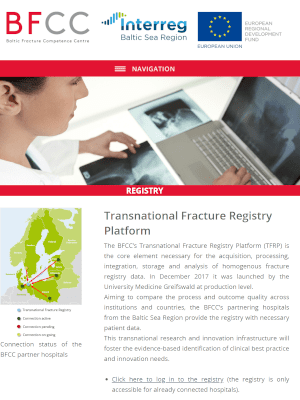BFCC
More fractures and stronger need for medical innovation in ageing societies
The number of bone fractures and linked health disorders are expected to increase in the future due to an ageing society. The annual number of fractures in the EU is estimated to rise from 3.5 million in 2010 to 4.5 million in 2025. Due to more age-related fractures and co-morbidities such as osteoporosis or post-surgery complications like infections, the need for innovative products and clinical treatment procedures is increasing. These innovations are meant to reduce the total cost of care or improve its quality.
Companies lack knowledge to offer better medical products
Companies that offer implants, imaging, pharmaceuticals, wound care or single-use surgery devices are facing various difficulties, e.g. in understanding the clinical needs, in following up on the effectiveness of treatment, in reducing costs and in offering innovation on the market. As around 50 % of new products are initiated by clinicians, the companies need direct access to hospitals. This allows them to collaborate within needs assessment, pre-clinical research, product development, clinical trials, post-market follow up studies and health technology assessment.
Budgets
in numbers
-
3.60MillionTotal
-
2.77MillionErdf
-
0.00MillionEni + Russia
-
0.00MillionNorway
Achievements
A digital registry to collect missing data and establish new links
In order to accommodate all these health and business needs, the BFCC project encouraged four hospitals in Germany, Estonia, Lithuania and Poland to join forces in the Transnational Fracture Registry Platform. The platform helped to acquire, store and process fracture data. The platform allowed to compare the clinical process and quality of outcomes across organisations and countries. At the end of the project the Fracture Registry contained several hundred complete data sets. As the work continues this number is growing every day and delivering new evidence.
Fracture Registry in action
Through practical usage of data gathered on the Transnational Fracture Registry Platform the project has improved the understanding of innovation processes in the medical technology industry. This way 48 companies gained opportunities to enter into a dialogue with the involved clinics and carry out research in fracture management. These businesses got a chance to align their innovation efforts with clinical requirements as well as gained access to the most recent findings in the fracture research.
The collaboration standards were tested, evaluated and optimized in the fields of infections, diagnostics and post-surgery complications. These tests featured different aspects such as a new classification system for fracture complications, a clinical study about a new commercially available bone substitute that elutes antibiotics, and a new method for hip fractures applied in a hospital setting. The companies involved gained insight into innovation cycles between industry and clinics in different Baltic Sea region countries and expanded their networks for future clinical industry cooperation.
Better treatment in the future
With EUR 3 million support from the European Union, the Interreg project BFCC has created a novel tool that gave a new dimension to cooperation of hospitals and medical technology industry. This in turn is likely to change treatment outcomes for thousands of patients who will experience fracture in the future.
Outputs
Transnational Fracture Registry Platform

Project Stories
-
20.12.2016
Mission to heal
Bone fractures are among the top ten reasons for people to spend time in a hospital across the Baltic Sea region. Bone fractures and health disorders linked to them will occur more frequently because of our ageing society. Implants can break. Fractures can get infected. And some fractures even never heal. The Baltic Fracture Competence Centre enables companies to develop new and better products. And it helps hospitals to identify best clinical practise so that patients stay in hospital shorter, get longer lasting implants and suffer from fewer complications. Partners from the medical industry, hospitals, research and treatment set up a transnational bone fracture registry as a basis for identifying clinical needs.Read full story
Partners
Life Science Nord Management GmbH
- TownHamburg
- RegionHamburg
- CountryGermany
- RepresentativeAnna Eckers
- Phone
- E-Mail
- Web
Stryker Trauma GmbH
- TownSchönkirchen
- RegionPlön
- CountryGermany
- RepresentativeNils Reimers
- Phone
- E-Mail
- Web
University Medical Center Schleswig-Holstein
- TownLübeck
- RegionLübeck, Kreisfreie Stadt
- CountryGermany
- RepresentativeArndt-Peter Schulz
- Phone
- E-Mail
- Web
University Medicine Greifswald
- TownGreifswald
- RegionVorpommern-Greifswald
- CountryGermany
- RepresentativeWolfgang Hoffmann
- Phone
- E-Mail
- Web
Sahlgrenska University Hospital
- TownMölndal
- RegionVästra Götalands län
- CountrySweden
- RepresentativeAnders Jönsson
- Phone
- E-Mail
- Web
ScanBalt fmba
- TownFrederiksberg
- RegionByen København
- CountryDenmark
- RepresentativePeter Frank
- Phone
- E-Mail
- Web
Lithuanian University of Health Sciences
- TownKaunas
- RegionKauno apskritis
- CountryLithuania
- RepresentativeŠarūnas Tarasevičius
- Phone
- E-Mail
- Web
LifeScience Krakow Klaster
- TownKraków
- RegionMiasto Kraków
- CountryPoland
- RepresentativeKazimierz Murzyn
- Phone
- E-Mail
- Web
University Hospital in Krakow
- TownKrakow
- RegionMiasto Kraków
- CountryPoland
- RepresentativeKatarzyna Wilk-Kwaskowska
- Phone
- E-Mail
- Web
University of Tartu
- TownTartu
- RegionLõuna-Eesti
- CountryEstonia
- RepresentativeAare Märtson
- Phone
- E-Mail
- Web
Tartu Biotechnology Park Ltd
- TownTartu
- RegionLõuna-Eesti
- CountryEstonia
- RepresentativePiia Vettik-Leemet
- Phone
- E-Mail
- Web
Bone Index Finland Ltd.
- TownKuopio
- RegionPohjois-Savo
- CountryFinland
- RepresentativeOssi Riekkinen
- Phone
- E-Mail
- Web
BONESUPPORT AB
- TownLund
- RegionSkåne län
- CountrySweden
- RepresentativeEva Lidén
- Phone
- E-Mail
- Web
-
Project managerAnna EckersLife Science Nord Management GmbH
-
Legal representativeHinrich HabeckLife Science Nord Management GmbH
-
Financial managerDaniel KloseDSN - Connecting Knowledge
-
Communication managerGesine StückDSN - Connecting Knowledge



